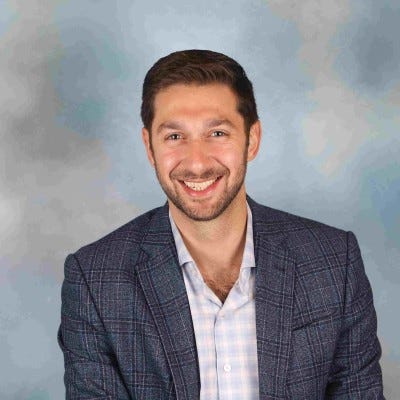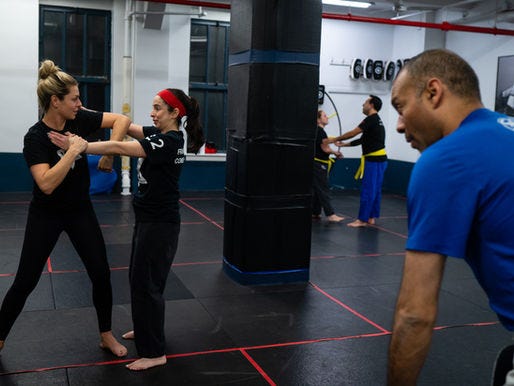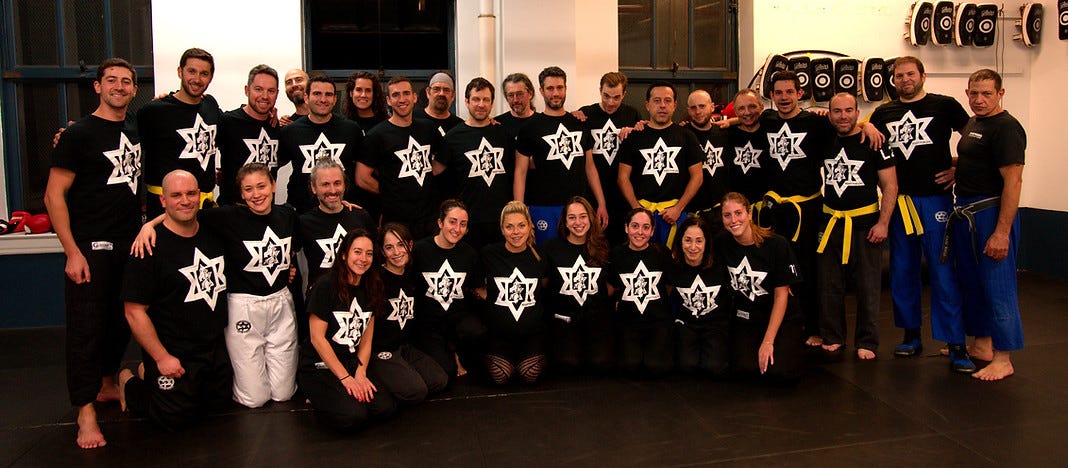The People of the Book and the Sword
An interview with the president of Legion, a NYC-based self-defense program for Jews.
If you were walking down the street and someone started approaching you, about to throw a punch, what would you do? Would you try to run? Would you freeze, too stunned to react (me 🙋🏼♀️)? Would you try to defend yourself and punch back? Do you know how?
Self-defense is an important skill to have, and unfortunately, its become all too necessary for Jews. Jews comprise about 2% of the U.S. population, but are the recipients of over 50% of of all religiously motivated attacks.
I first learned about the self-defense program, Legion, shortly after October 7th, when I attended an alumni event for the Israel education bootcamp, Fuel for Truth. The same people who started FFT started this program, which teaches Krav Maga—Israeli martial arts—as well as defense against an active shooter, situational awareness, and combat first aid.
Created in 2014, Legion was the first nonprofit in the U.S. dedicated to training Jews and Jewish allies to defend themselves. Here’s an interview with its president, Corey Feldman. Hopefully it will inspire you to learn how to come to your own rescue.
What is the origin story of Legion?
I actually took over Legion from the founder, Jon Loew, and it's the same crew that started Fuel for Truth, which they started in the wake of 9/11. They quickly realized that people were going to start blaming Jews for 9/11, and that they there needed to be a way to educate young Jewish people about Israel and the truth behind a lot of these false claims like BDS, genocide, etc.
About 15 years later, they reached out to major Jewish organizations and said, “This kind of counterfactual current of misinformation began as we said it would, and we now see a stream of physical violence on the horizon. Do you want to be involved in this?” And no major Jewish organization would put their name on it. Everyone said Jon was crazy. Of course, now it's a fairly accepted reality that Jews need to defend themselves; it’s not a far-off concept, but one that’s pertinent and relevant to current affairs, not just in New York, but across America, and the world.
The idea was that Jews are the people of the book… and the sword. We always have been, but perhaps in America we forgot part of that legacy, that throughout our history, we have always had to fight to survive, and that things are not given to us. So, the idea is that you come to your own rescue, both in terms of your ability to speak, particularly about Israel, and that if, G-d forbid, you need to defend yourself, your family, and your community, you know how to do so.
Can you touch on the importance of knowing self-defense given today's climate of antisemitism, especially compared with those who advocate for the right to carry?
I think, in general, people have the wrong idea about the role of police. The police come to pick up the pieces. It’s very rare that police arrive in time or happen to be there when a physical incident occurs, be it on the Subway or on the street. We saw the videos of people asking if there's any Zionist on this train, right? You're going to have a couple minutes in a situation like this, where it's just you and the perpetrator or perpetrators. We believe in the role of police and a democratic society, but we can't rely exclusively on them to help us.
I think self-defense is a skill that everyone should know. Because Jews are targets these days, it becomes particularly important. We have at least two members who have been attacked and used what they learned in Legion to get to safety. I've seen the flip get switched, like in basic training, they turned us from civilians into soldiers and taught us how to summon up the aggression necessary to defend ourselves or our teammates, if necessary. And I didn't think that was really possible in a civilian context. But over the course of Legion’s training, I've seen it in people who were afraid to get hit, or afraid to even show up on the mats, who found that fire within them when it mattered and learned to call that up and use it in training. That’s been very cool to see among my fellow classmates.
Have you seen an uptick in registrations for the classes in the past year?
In October, I actually got called up to the reserves. I flew to Israel with my team and was in Gaza for six weeks, so I handed Legion over to our COO and our chairwoman. We usually had 30 or 40 people training in Manhattan, and after October 7th, we got up to about 100. We had to open up a secondary class on Sundays. I think it has subsided a little bit from the October 7th levels. People have a short memory, unfortunately, or at least become used to whatever the “new normal” is, so to speak. But still, we get a steady stream of registrants and participants, and most of them come from referrals of people who have done the class before.
What advice would you give to someone who doesn't think they are strong or quick enough to know self-defense?
We have a 75-year-old who got his yellow belt in our Connecticut chapter, and a Holocaust survivor did one of our classes in Manhattan. If he can get to the mats, what's your excuse? Everyone does what they're capable of. The spectrum of skill and background is very wide, and you partner with someone who is at your skill level. Inevitably, there are people within whatever cohort you find yourself in, from “never done self-defense in my life” to “I was a lone soldier in the IDF.” Every class has a mix of those sorts of people.
Do you see self-defense as a way to empower Jewish individuals beyond physical safety? How does it impact participants’ confidence and overall sense of security?
First of all, I think it connects Jews that practice the art to our history. Krav Maga was developed in the 30s by a Jew as a response to Nazi gangs that were roaming the streets of Eastern Europe. Sad to say there are some parallels to that, at least in New York City today. And I think feeling a connection to that legacy that goes from obviously pre-WWII to Israeli history to the Maccabees, it's a matter of pride and education in terms of where we came from.
As for confidence, I saw people who came into this class afraid, who by the end, you know, found their confidence. I remember in particular, one of my friends who's 5’9 or 5’8—I'm 6’2—and he was very skittish, and all of a sudden, eight months into the class, the bell goes off and he runs right at me. The fear was gone. And I think that's something that transcends self-defense, like that sort of confidence, knowing that you know how to defend yourself. It opens up a whole new world. It is similar to the idea that what I learned from the army forever changed my perspective and my belief in myself and what I could accomplish. I think for a lot of people, this class does something similar, where it's well beyond just self-defense. I’ve had a lot of people tell me that it has had a meaningful impact on them beyond just the physical stuff.
What are your Shabbat plans?
I am going home to spend Shabbat with my family in Westchester. My brother and his wife's daughter, Remi, will receive her Hebrew name in shul on Saturday.
Legion is doing rolling admission in the Brooklyn chapter. Stanford and Manhattan usually have set start dates. If you’re interested in coming to your own rescue, you can learn more on Legion’s website. You can contact them with the location you’re interested in, and someone will reach back out.
Stay safe and as always, Shabbat Shalom,






Learn the gun rules where you live. Go to a gun store and buy a gun. Go to a shooting range and learn to use your new gun.